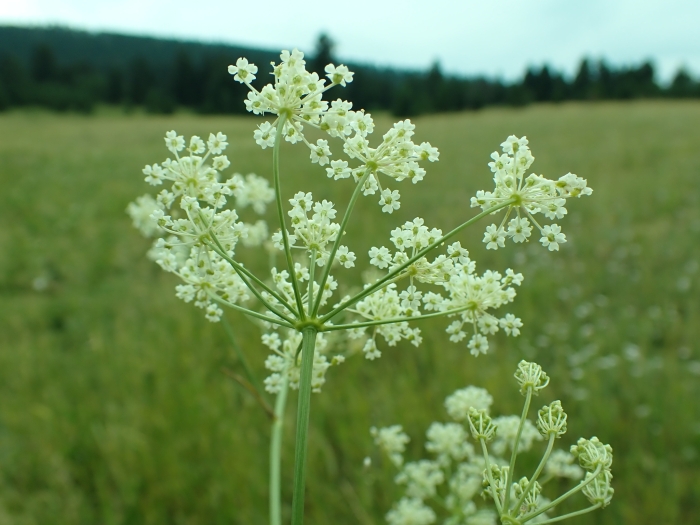Gardner’s Yampah
(Perideridia gairdneri)
Gardner’s Yampah (Perideridia gairdneri)
/
/

Matt Lavin
CC BY 4.0
Image By:
Matt Lavin
Recorded By:
Copyright:
CC BY 4.0
Copyright Notice:
Photo by: Matt Lavin | License Type: CC BY 4.0 | License URL: http://creativecommons.org/licenses/by/4.0/ | Rights Holder: Matt Lavin | Publisher: iNaturalist | Date Created: 2023-08-05T13:51:44-07:00 |

























Estimated Native Range
Summary
Perideridia gairdneri, commonly known as Gardner’s yampah or common yampah, is a perennial herb that thrives in moist meadows, grasslands, and open forest clearings in western North America, ranging from southwestern Canada through California to New Mexico. It typically grows up to 3 feet tall, emerging from cylindrical tubers. This plant features slender, erect stems and finely divided, feathery leaves that give it a delicate appearance. From mid-summer to early fall, Gardner’s yampah produces compound umbels of small, showy white flowers that attract pollinators.
Gardner’s yampah is valued for its historical culinary use and its potential for modern foraging, as its tubers are edible and were a staple food for many Native American tribes, who prepared them similarly to potatoes. In cultivation, it can serve as an attractive addition to native plant gardens and restoration projects due to its low maintenance and adaptability to various soil conditions. It prefers full sun to part shade and requires moist, well-drained soils. While it is not commonly found in the horticultural trade, it can be a conversation starter due to its historical significance and resemblance to the toxic water hemlock, which necessitates careful identification.CC BY-SA 4.0
Gardner’s yampah is valued for its historical culinary use and its potential for modern foraging, as its tubers are edible and were a staple food for many Native American tribes, who prepared them similarly to potatoes. In cultivation, it can serve as an attractive addition to native plant gardens and restoration projects due to its low maintenance and adaptability to various soil conditions. It prefers full sun to part shade and requires moist, well-drained soils. While it is not commonly found in the horticultural trade, it can be a conversation starter due to its historical significance and resemblance to the toxic water hemlock, which necessitates careful identification.CC BY-SA 4.0
Plant Description
- Plant Type: Herb
- Height: 1.5-3 feet
- Width: 1-2 feet
- Growth Rate: Moderate
- Flower Color: White
- Flowering Season: Spring, Summer, Fall
- Leaf Retention: Deciduous
Growth Requirements
- Sun: Part Shade, Full Shade
- Water: High
- Drainage: Medium, Slow
Common Uses
Bee Garden, Edible*Disclaimer: Easyscape's listed plant edibility is for informational use. Always verify the safety and proper identification of any plant before consumption., Low Maintenance
Natural Habitat
Moist meadows, grasslands, and open forest clearings
Other Names
Common Names: Yampah, Indian Parsnip, Indian Caraway, Common Yampah, False Caraway, Squawroot, Yamp, Gairdner’s Yampah
Scientific Names: , Perideridia gairdneri, Endosmia praealta,
GBIF Accepted Name: